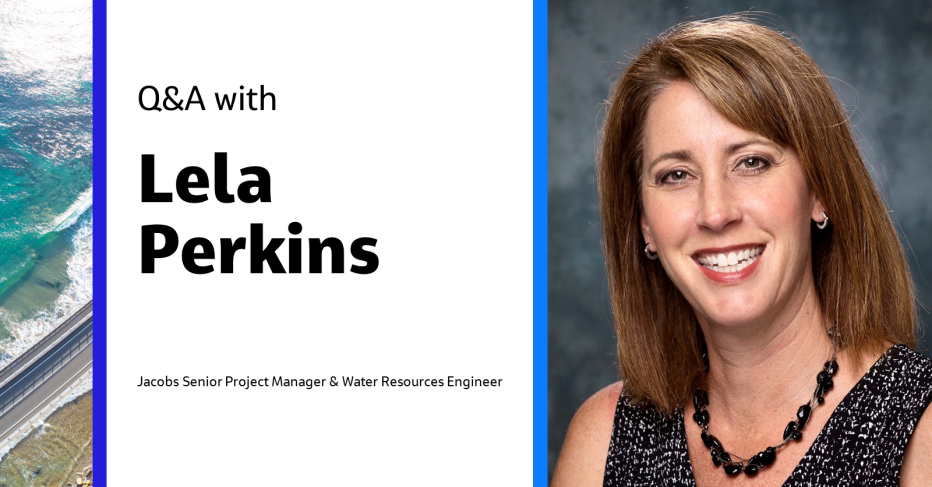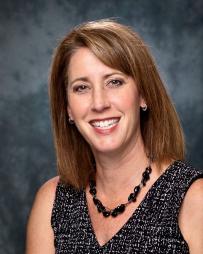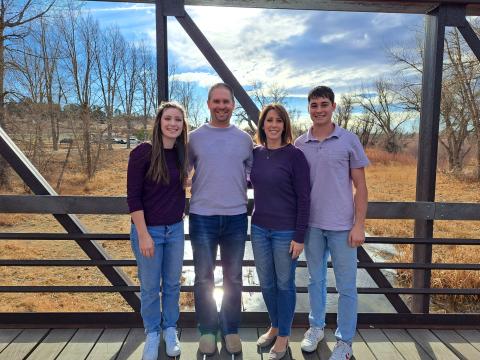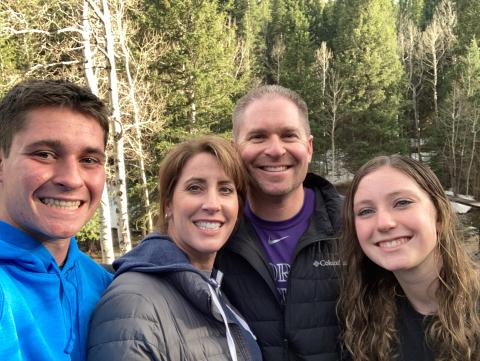We sat down with Lela Perkins, a senior project manager & water resources engineer, to learn more about the importance of holistic water management solutions that are tailored to the unique communities they serve.
In this Q&A, she shares how she has been able to combine her passion for water, engineering, travel and connecting with communities in both her work at Jacobs and in her personal life.

Lela, you’ve been involved in water resources planning across the U.S. for a couple of decades. How did you get involved in your current work?
For as long as I can remember, I have been interested in learning about water and loved doing things that involved water. When I was in high school my guidance counselor noted that I was good at math and science and liked water, so they suggested I go to school for engineering. At the time, I was also interested in law so I thought I would get an engineering degree and then go to law school to eventually practice water rights law, but while I was getting my bachelor's degree, my advisor convinced me to go to graduate school instead of law school.
I ultimately went to graduate school for water and wastewater treatment. I always knew that I wanted to be on the planning side of things. I wasn't a detailed designer, I was more interested in the holistic perspective. After obtaining my master’s, I started my career in consulting doing planning for water and wastewater treatment facilities. About ten years into my career I transitioned to water resources, which I have been doing ever since.
How have approaches to water management changed over the course of your career?
I think that water management has become more integrated and holistic as water resources become stretched and stressed. Worldwide, we're looking at new ways to use and reuse water. A holistic approach that considers water users, the environment and other aspects that historically haven't necessarily been considered, is critical. There is also an increased realization of the bigger, broader water cycle and intersection of water users. It's more important than ever to look at partnerships whether that's local or regional partnerships, as these are increasingly required to deliver solutions.
A prime example of this is the Colorado River Basin, which has faced more than 20 years of drought and increasing demands. Basin stakeholders are working to create solutions to address increasing demands while preparing for future hydrologic uncertainties.
Can you share a time where advances in technology have aided in delivering a water management solution?
One example of where advances in technology have aided in developing water management solutions is in the development of operational guidelines for the Colorado River Basin. There is extensive modeling that goes into defining operational scenarios and the latest modeling platforms allow in-depth investigation, not only of different operational scenarios, but also the impacts that climate change has on hydrology.
We understand your career has taken you worldwide to learn about water, how has that experience shaped your perspective?
I have been fortunate to travel for work across North America and to the Middle East, Europe and Africa, and that experience has impressed upon me the need for unique solutions for each situation; there really is not a one-size-fits-all approach. Communities are different. Environments are different. Access to resources – whether those are water, energy, technical expertise or technology – are so very different.
Several years ago, I was working on a project in Eritrea in East Africa and while I was there, I visited a water treatment plant there that had fallen into disrepair. Although a conventional treatment plant, it had a lot of mechanical equipment, and the community just did not have the resources to maintain it. When we visited, the chemical feed pumps were nonoperational, and the “chlorination system” was actually a person who sat there and dumped a scoop of chlorine into the water every 15 minutes.
In May of 2022, I went to Ukraine as part of an international disaster response team. We spent our time there trying to get water to communities whose water supply had been impacted because of the war. North of Kyiv, that involved replacing stolen equipment. In southern Ukraine, a major city’s water supply had been cut off and they had no access to fresh water. We worked to drill wells to access brackish groundwater and install package reverse osmosis treatment systems and tap stands around the city.
Water is the lifeblood of everyone and everything, and I would argue that it’s the most valuable resource in the world. I think that becomes really apparent when you don't have it, whether it’s a dwindling water supply on the Colorado River caused by drought or an abrupt interruption of supply due to war.
“There really is not a one-size-fits-all approach. Communities are different. Environments are different. Access to resources – whether those are water, energy, technical expertise or technology – are so very different.”
Where makes you excited about water resource management going in the future?
The collaboration, integration and being a part of something that is super impactful excites me about the future of water resource management. Water resources affect everyone and everything. I used to say, “if you turn on your tap or flush your toilet and you don't think about it, then we are doing our job.”
I think that the key to approaching the development of solutions, in the Colorado River Basin or anywhere else, hinges upon collaborative engagement with all stakeholders and trying to build consensus around alternatives while understanding that there are limited resources. It is challenging work for sure, but very rewarding.
When you’re not working, what can we find you doing in your free time?
When I am not working, I am trying to keep up with two teenagers, planning trips for my family to take, or volunteering, and ideally I’m doing a combination of those things. Traveling is a huge passion of mine. I have a world map in my home office that has pins in it of where I have been and if there isn't a pin, it’s fair game. I’m always trying to put more pins in the map. I have visited five of the seven continents and my plan is to visit them all.
One other thing I like to do in my free time is head to the mountains. A couple of years ago we purchased some land with an off-the-grid cabin (“cabin” is a generous term.) The last couple summers I have just loved being up there and hiking. It's also near the site of the water diversion that prompted the first water rights court case in Colorado – just a fun nerdy fact that makes me love the area even more.
If you could give your younger self advice, what would it be?
I would probably tell my younger self to slow down a little bit, but I don't think I would have taken my own advice. The advice that I give others is to get involved early in your career in professional organizations – that was incredibly beneficial for me.. When I was just out of school, I got involved with the American Water Works Association and that involvement opened so many doors and opportunities and gave me exposure that was key in shaping the trajectory of my career. Even in our virtual world, building relationships and networking are still very important.
What do you enjoy most about being part of #OurJacobs?
I really like the people at Jacobs. I have been in consulting for over two decades and what ultimately brought me to Jacobs was the folks that I was going to be working with. Several of us had worked together previously, and I am so grateful to be a part of such a great team
About the interviewee

Lela Perkins is a senior project manager & water resources engineer based in our Greenwood Village, Colorado office. Lela has over 20 years of experience and specializes in all aspects of water systems planning. As a senior technical leader and project manager, Lela specializes in water resources planning throughout the U.S. West. She is recognized as an expert in facilitating meetings and workshops with diverse stakeholders and skilled at identifying client’s needs and assembling world-class teams that deliver solutions.
You might be interested in...
Join #OurJacobs team
What drives you drives us as we work to build a better world – together. At Jacobs, every day is an opportunity to make the world better, more connected, more sustainable. We’re always looking for dynamic and engaged people to join our team. Bring your passion, your ingenuity and your vision.















































